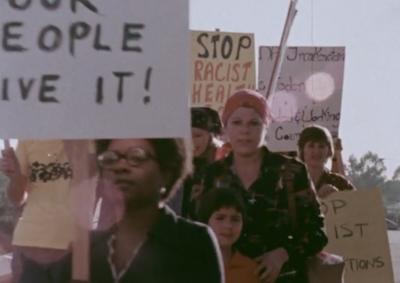Restoration World Premiere!
We’re Alive
U.S., 1974
Michie Gleason, Christine Lesiak and Kathy Levitt, graduate students at UCLA in 1974, made the documentary We’re Alive as part of a class assignment focused on community engagement. Driven by their activism and an interest in the experiences of incarcerated women, the filmmakers designed and led a Portapack video workshop at the California Institution for Women (CIW) in Chino, at the time the largest women’s prison in the United States.
Gleason, Lesiak and Levitt wanted their mark as filmmakers to be unnoticeable: collaborating with incarcerated people, whose participation was voluntary, in order to give the community an opportunity to speak for themselves about the individual and collective experiences. The participants, taught how to use the equipment, videotaped portions of the roundtable interviews and group talk. The film balances anonymity with intimacy as the participants, who speak in detail and are never identified by name, report candidly on the complexities of life inside the carceral institution while describing the set of challenges and fears they will face when released. Capturing the consciousness-raising style of dialogue that defined feminist discourse in the 1970s, the women share an acute perspective on prison abolition informed by experiences of gendered and racialized discrimination and economic disenfranchisement, the effects of drug addiction, and the parole board’s abuse of power. Several participants recognize the camaraderie—political, platonic and romantic—that they have experienced in prison.
The Archive learned about the documentary around 2016 when requests for the film—whose sparse credits mention UCLA but none of the individuals involved—started filtering into the Archive Research and Study Center. The British Film Institute generously shared its 16mm prints of the film that the Archive scanned for research access. Media scholars Beth Capper and Rox Samer have given context to the documentary, but its complete production history remained largely unknown until Levitt, while attending the 2022 UCLA Festival of Preservation, introduced herself to Archive staff and mentioned the film she co-produced as a UCLA student. At last, this powerful, and once orphaned, film has returned to UCLA and with it the strong, clear voices of incarcerated women telling their stories of being alive.
Following the film, the filmmakers of We’re Alive will join moderator Colby Lenz, CSW | Streisand Center Deputy Director of Policy and Community Research, and members of the California Coalition for Women Prisoners (CCWP), Romarilyn Ralston and Susan Bustamante, who experienced incarceration at CIW. The conversation will reflect on the continuities between prison conditions in the 1970s and the current realities of surviving California’s carceral state.
DCP, b&w/color, 49 min. Directors: Michie Gleason, Christine Lesiak, Kathy Levitt and the women prisoners of the California Institution for Women. Credited as “The Video Workshop of the California Institution for Women and the Women’s Film Workshop of the University of California, Los Angeles.”
Digitally restored by the UCLA Film & Television Archive. Funding provided by the Columbia Motion Picture Research Fund. Laboratory services provided by illuminate Studios and Endpoint Audio Labs. Special thanks to Michie Gleason, Kathy Levitt, Chris Mohanna Lesiak, and the British Film Institute.
Special thanks to our community partners: California Coalition for Women Prisoners, UCLA School of Theater, Film and Television.

Watch the film:
Watch the post-screening conversation:
Additional reading:
UCLA Newsroom: In 2023, the Librarian of Congress named We’re Alive to the National Film Registry.
Archive Blog: “The Whole System”: “We’re Alive” and Feminist Anti-carceral Struggles
Archive Blog: “We're Alive”: The State as Great Big-armed Mother
Archive Blog: Interview: “We're Alive” and Experiences of Incarceration at CIW
UCLA Magazine: The Second Life of ‘We’re Alive’
UCLA Newsroom: Injustice remains: 48-year-old women’s prison documentary shows how little has changed






 Mobile Navigation
Mobile Navigation

